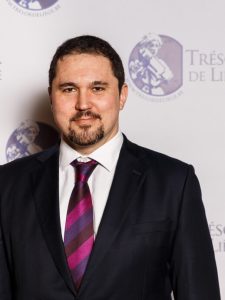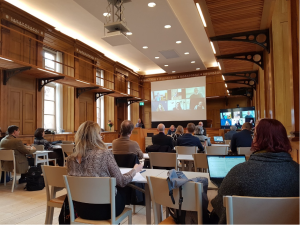
Georges Kazan, DPhil (Oxon) Senior Research Fellow TIAS (Archaeology) University of Turku
“All knowledge begins with a question”
Neil Postman
Today’s world is increasingly facing complex challenges, from Climate Change to Covid-19, and beyond. Historically, interdisciplinary research has served as an approach (not an end) to a problem that cannot be fully embraced by any single discipline. New disciplines, such Neuroscience or Biochemistry, have emerged as a result, enabling the complex problems to be studied more effectively and in greater depth. But what exactly is interdisciplinarity? This is a word that Microsoft Word, at least, does not recognise. Definitions of interdisciplinarity and transdisciplinarity are currently diverse and contested. Similarly, the structures supporting interdisciplinary research have not been extensively studied. The reason for this may be that most definitions focus on what interdisciplinarity is, rather than how it is performed, and that explorations of best practices for interdisciplinary research often require the reassessment of university models themselves.
Most university research originates within a discipline-based research environment, prevalent since the 19th century. This enables scholars to deepen knowledge in specific fields. This process can, however, result in increased distance between disciplines, fragmenting the research landscape and reducing efficiency. Those who dare to reach across the divide and incorporate data and/or methods from other disciplines in order to enhance their research can face a number of barriers:
- Existing disciplinary structures do not provide a ready fit for interdisciplinary research
- Assessment of research publications and funding often dominated by disciplinary expertise
- Not always possible to explain the future output of research that is exploratory in nature
- Lack of a common epistemic frame of reference to connect separate disciplines
As a result of points 1-3, interdisciplinary research often lacks the funding and freedom it needs to proceed effectively. Point 4 tends to particularly affect researchers in qualitative fields within the Social Sciences and Humanities (SSH), where there tends to be less conceptual overlap between (and even within) fields. However, if an interdisciplinary concept and framework can be established successfully, there is then an opportunity to integrate the new research into existing disciplinary structures by establishing it as a field in its own right. To develop and undertake interdisciplinary research, therefore, scholars require the time, facilities, flexibility and autonomy to take risks in pursuing potentially unproductive research for its own sake.
The Institute for Advanced Study (IAS) model offers the only established platform in academia for ‘bottom-up’, interdisciplinary research. While universities are increasingly managed using market-based models, with a strict focus on academic and societal impact, the IAS concept was established in Princeton almost a century ago to enable curiosity-driven pursuit of knowledge with no view to its immediate utility or the expectation of meeting predetermined goals. Since 2000, the number of IASs has grown significantly, part of a general trend of increasing support for environments without a specific research focus. Many of these more recent IASs, such as Turku Institute for Advanced Studies, are situated within universities, where they serve to enhance excellence and increase institutional prestige. In China, the transformative potential of IASs has been recognised as an important starting point for the reform of Higher Education Institution (HEI) research, with a network of 15 IASs now integrated into China’s HEI landscape (China Network of Institutes for Advanced Studies 2018).
Due to cultural similarities and a strong commitment towards public investments in social welfare and education, Nordic societies are often grouped together as exponents of the ‘Nordic Model.’ Such approaches have resulted in unique levels of social capital and trust. At the same time, if the Nordic Model of public investment is to survive complex, existential, threats (e.g. aging populations, changing working models, global competitiveness), it must evolve and adapt to changes in its surroundings. This is directly relevant in the Nordic Higher Education Institution (HEI) sector, which is at present mostly state-funded. Within the Nordic HEI sector therefore, there is both an opportunity and a necessity for separate research institutions to connect and collaborate on a shared basis of mutual trust. Bringing down barriers to knowledge exchange also provides new possibilities for disciplinary and interdisciplinary research in a range of areas, on issues of high societal significance.
IASs present an ideal environment for such an initiative. Within the Nordic region, eight IASs exist at present. However, these generally operate in isolation of each other, are based on a range of different operating models, and participate in different international IAS networks or consortia. At the instigation of Professor Martin Cloonan (Director, TIAS), I conceived and developed, on TIAS’s behalf, a three-workshop series, Beyond Advanced Studies, in partnership with the Swedish Collegium for Advanced Study and Aarhus Institute of Advanced Studies. Funding for this was provided by the Joint Committee for Nordic research councils in the Humanities and Social Sciences (NOS-HS). The purpose of this series is to explore a co-ordinated approach to the IAS concept in the Nordic region by exploring the core question of “What is the Nordic approach to IAS and interdisciplinary research?” By building critical mass and concentrating expertise, it seeks to provide a platform within the Nordic region for disciplinary, sectoral and international dialogue in an important area – interdisciplinary research.

Photo: Beyond Advanced Studies – Workshop I, Swedish Collegium for Advanced Study
In November 2021, the first workshop in the series took place in Uppsala, Sweden, arranged and hosted by the Swedish Collegium for Advanced Study. Directors and Fellows of Nordic Institutes for Advanced Studies (IASs), plus expert guests from inside and outside academia, met in-person and via video conferencing for an exploratory discussion of interdisciplinarity, researcher careers and applications of the IAS concept. In addition to presentations by directors of Nordic IASs, the workshop was addressed by experts on the IAS model and on interdisciplinary research practices, as well as representatives of the Swedish Research Council and other interdisciplinary units. Swedish Collegium fellows, including members of its Erik Allardt fellowship scheme and early-career programme, Pro Futura Scientia, also shared their experiences. The participation of French, British and German IAS directors was especially valuable, helping to establish common ground internationally and throw light onto aspects specific to Nordic IASs. An online open innovation tool was used to capture ideas and perspectives throughout. The next workshop will take place in Aarhus (8-9 March 2022), with the series concluding in Turku at the final workshop. After this, conclusions will be compiled and summary findings published.
The increased emphasis being placed on interdisciplinary research at institutional level (e.g. Horizon Europe and NordForsk) provides significant opportunities to establish, within a disciplinary context, the new approaches developed within Nordic and European IASs, for example as larger research projects or research units. By facilitating closer co-operation between IASs, and collaborative refinement of IAS mechanisms, Beyond Advanced Studies seeks to consolidate and stimulate Nordic approaches to the IAS model, for the benefit of interdisciplinary researchers and research alike.
Please feel free to follow us on the website and Twitter link below:
Beyond Advanced Studies
Website: https://sites.utu.fi/beyond-ias/
Twitter: @StudiesBeyond
